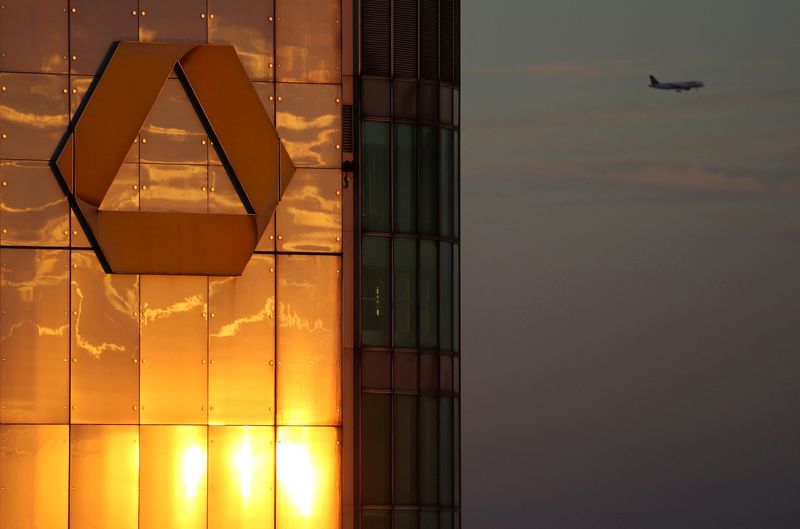By Valentina Za, Tom Sims and Andreas Rinke
MILAN/FRANKFURT (Reuters) -German Chancellor Olaf Scholz slammed as “an unfriendly attack” UniCredit’s move to become the biggest investor in rival Commerzbank (ETR:) with a potential 21% stake, marking growing hostility towards the Italian bank.
The German establishment’s ire towards UniCredit using derivatives to more than double its potential stake before obtaining regulatory clearance for an actual holding of more than 9.9% piles pressure on European Central Bank supervisors.
Led by German academic Claudia Buch, they are now called to rule on UniCredit’s request to buy up to 29.9% of Commerzbank.
“Unfriendly attacks, hostile takeovers are not a good thing for banks, and that is why the German government has clearly positioned itself in this direction,” Scholz said on the sidelines of an event in New York.
His words sent Commerzbank shares down 5.9% as investors reassessed the chances of a full takeover. UniCredit closed down 3.3%.
UniCredit CEO Andrea Orcel’s bold attempt to build Europe’s biggest bank has become a test of the bloc’s resolve to overcome national borders to retain global relevance.
After unveiling a 9% stake in Commerzbank this month, Orcel has said he would seek a tie-up if he could garner support, adding he could also just hold onto the stake, or sell it.
Friedrich Merz, the Christian Democrat opposition leader whom many see as Germany’s next chancellor, described Orcel’s tactics as “amateur” and a takeover as a “disaster for Germany’s banking market”, pointing to the precedent of HVB.
UniCredit, which has up to 6.5 billion euros in capital it could use for acquisitions, bought in 2005 Bavarian bank HVB, whose business, though much smaller, is more profitable than Commerzbank’s after hefty staff cuts over the years.
“The ball is firmly in the ECB’s court. If they approve the increase, UniCredit will control enough to lead the game,” academic and former ECB supervisor Ignazio Angeloni said.
“UniCredit could also just fold HVB into Commerzbank and have a large stake in a German bank. It’s not ideal, we’re still far from a ‘European JPM’, but it’s a first step in the right direction for Europe,” he added.
European lenders lag in size and value their U.S. peers, such as JP Morgan.
UNEXPECTED TURN
UniCredit’s move comes after Germany’s finance agency on Friday said it would not sell any more Commerzbank shares for now, with the bank’s strategy “geared towards independence”.
Germany still owns 12% of Commerzbank. UniCredit is seeking ECB approval to increase its Commerzbank holding just below the 30% which triggers a mandatory takeover under German corporate laws.
UniCredit has said it would only take possession of the Commerzbank shares linked to the derivative contracts it used to increase its potential holding if it secured ECB approval.
The ECB has up to 60 days, which can be extended to 90, to rule.
Acknowledging UniCredit’s stakebuilding on Monday, Commerzbank said it would “always examine strategic options responsibly in the interests of its stakeholders”.
Shares in Commerzbank have gained around 20% since UniCredit emerged as the biggest private investor after the German state, lifting Commerzbank’s market value to around a third of UniCredit’s over 60 billion euros.
“The situation has taken an unexpected turn, as the market was expecting a slow timeline and no action in the short term, as well as … a ‘friendly development’,” Citi analysts said.
Germany’s Verdi union opposed the development and vowed to “fight with all means for independence”.
Commerzbank, with more than 25,000 business customers, almost a third of German foreign trade payments and more than 42,000 staff, is a linchpin of the German economy.
Unions fear job losses as German banks have much high labour costs than Italian peers.
UniCredit defended the merits of a combination, after unveiling the higher stake which sources said it had built with help from Barclays.
“UniCredit believes that there is substantial value that can be unlocked within Commerzbank, either stand-alone or within UniCredit, for the benefit of Germany and the bank’s wider stakeholders,” it said in a statement.
Italy’s Foreign Minister Antonio Tajani defended UniCredit’s approach.
“Being pro-European only in words leaves something to be desired,” Tajani said.
POLITICAL UPHEAVAL
Orcel first blindsided the German government when it outbid rivals in a tender to buy 4.5% of Commerzbank from the state this month, having already amassed a similar sized stake on the market.
The escalation comes at a time of political upheaval in Germany, where the three political parties governing the country frequently clash and continue to lose ground to the ultra conservative Alternative for Germany party.

This disarray could make it harder for the government to forge a strong response the unwanted Italian advance.
“UniCredit now has a better starting position with this large share package … It creates a certain momentum,” said Michael Grote, a professor at the Frankfurt School of Finance & Management.







